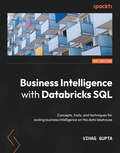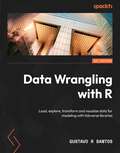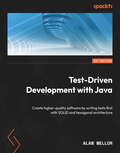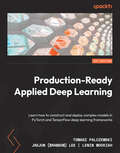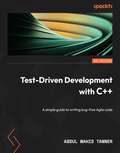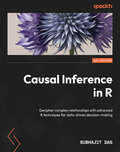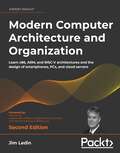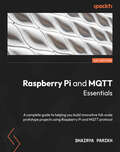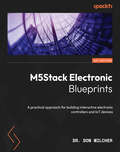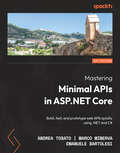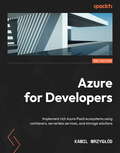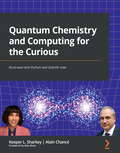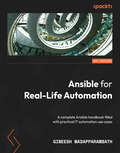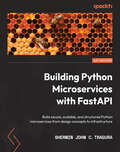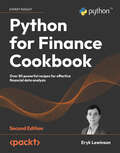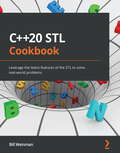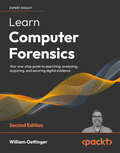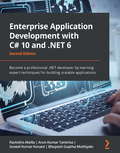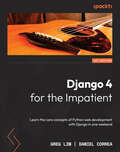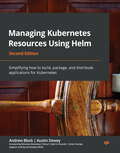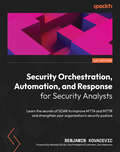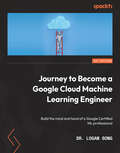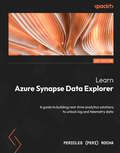- Table View
- List View
Business Intelligence with Databricks SQL: Concepts, tools, and techniques for scaling business intelligence on the data lakehouse
by Vihag GuptaMaster critical skills needed to deploy and use Databricks SQL and elevate your BI from the warehouse to the lakehouse with confidenceKey FeaturesLearn about business intelligence on the lakehouse with features and functions of Databricks SQLMake the most of Databricks SQL by getting to grips with the enablers of its data warehousing capabilitiesA unique approach to teaching concepts and techniques with follow-along scenarios on real datasetsBook DescriptionIn this new era of data platform system design, data lakes and data warehouses are giving way to the lakehouse – a new type of data platform system that aims to unify all data analytics into a single platform. Databricks, with its Databricks SQL product suite, is the hottest lakehouse platform out there, harnessing the power of Apache Spark™, Delta Lake, and other innovations to enable data warehousing capabilities on the lakehouse with data lake economics. This book is a comprehensive hands-on guide that helps you explore all the advanced features, use cases, and technology components of Databricks SQL. You'll start with the lakehouse architecture fundamentals and understand how Databricks SQL fits into it. The book then shows you how to use the platform, from exploring data, executing queries, building reports, and using dashboards through to learning the administrative aspects of the lakehouse – data security, governance, and management of the computational power of the lakehouse. You'll also delve into the core technology enablers of Databricks SQL – Delta Lake and Photon. Finally, you'll get hands-on with advanced SQL commands for ingesting data and maintaining the lakehouse. By the end of this book, you'll have mastered Databricks SQL and be able to deploy and deliver fast, scalable business intelligence on the lakehouse.What you will learnUnderstand how Databricks SQL fits into the Databricks Lakehouse PlatformPerform everyday analytics with Databricks SQL Workbench and business intelligence toolsOrganize and catalog your data assetsProgram the data security model to protect and govern your dataTune SQL warehouses (computing clusters) for optimal query experienceTune the Delta Lake storage format for maximum query performanceDeliver extreme performance with the Photon query execution engineImplement advanced data ingestion patterns with Databricks SQLWho this book is forThis book is for business intelligence practitioners, data warehouse administrators, and data engineers who are new to Databrick SQL and want to learn how to deliver high-quality insights unhindered by the scale of data or infrastructure. This book is also for anyone looking to study the advanced technologies that power Databricks SQL. Basic knowledge of data warehouses, SQL-based analytics, and ETL processes is recommended to effectively learn the concepts introduced in this book and appreciate the innovation behind the platform.
Data Wrangling with R: Load, explore, transform and visualize data for modeling with tidyverse libraries
by Gustavo R SantosTake your data wrangling skills to the next level by gaining a deep understanding of tidyverse libraries and effectively prepare your data for impressive analysisPurchase of the print or Kindle book includes a free PDF eBookKey FeaturesExplore state-of-the-art libraries for data wrangling in R and learn to prepare your data for analysisFind out how to work with different data types such as strings, numbers, date, and timeBuild your first model and visualize data with ease through advanced plot types and with ggplot2Book DescriptionIn this information era, where large volumes of data are being generated every day, companies want to get a better grip on it to perform more efficiently than before. This is where skillful data analysts and data scientists come into play, wrangling and exploring data to generate valuable business insights. In order to do that, you'll need plenty of tools that enable you to extract the most useful knowledge from data.Data Wrangling with R will help you to gain a deep understanding of ways to wrangle and prepare datasets for exploration, analysis, and modeling. This data book enables you to get your data ready for more optimized analyses, develop your first data model, and perform effective data visualization.The book begins by teaching you how to load and explore datasets. Then, you'll get to grips with the modern concepts and tools of data wrangling. As data wrangling and visualization are intrinsically connected, you'll go over best practices to plot data and extract insights from it. The chapters are designed in a way to help you learn all about modeling, as you will go through the construction of a data science project from end to end, and become familiar with the built-in RStudio, including an application built with Shiny dashboards.By the end of this book, you'll have learned how to create your first data model and build an application with Shiny in R.What you will learnDiscover how to load datasets and explore data in RWork with different types of variables in datasetsCreate basic and advanced visualizationsFind out how to build your first data modelCreate graphics using ggplot2 in a step-by-step way in Microsoft Power BIGet familiarized with building an application in R with ShinyWho this book is forIf you are a professional data analyst, data scientist, or beginner who wants to learn more about data wrangling, this book is for you. Familiarity with the basic concepts of R programming or any other object-oriented programming language will help you to grasp the concepts taught in this book. Data analysts looking to improve their data manipulation and visualization skills will also benefit immensely from this book.
Test-Driven Development with Java: Create higher-quality software by writing tests first with SOLID and hexagonal architecture
by Alan MellorDrive development with automated tests and gain the confidence you need to write high-quality softwareKey FeaturesGet up and running with common design patterns and TDD best practicesLearn to apply the rhythms of TDD – arrange, act, assert and red, green, refactorUnderstand the challenges of implementing TDD in the Java ecosystem and build a planBook DescriptionTest-driven development enables developers to craft well-designed code and prevent defects. It's a simple yet powerful tool that helps you focus on your code design, while automatically checking that your code works correctly. Mastering TDD will enable you to effectively utilize design patterns and become a proficient software architect.The book begins by explaining the basics of good code and bad code, bursting common myths, and why Test-driven development is crucial. You'll then gradually move toward building a sample application using TDD, where you'll apply the two key rhythms -- red, green, refactor and arrange, act, assert. Next, you'll learn how to bring external systems such as databases under control by using dependency inversion and test doubles. As you advance, you'll delve into advanced design techniques such as SOLID patterns, refactoring, and hexagonal architecture. You'll also balance your use of fast, repeatable unit tests against integration tests using the test pyramid as a guide. The concluding chapters will show you how to implement TDD in real-world use cases and scenarios and develop a modern REST microservice backed by a Postgres database in Java 17.By the end of this book, you'll be thinking differently about how you design code for simplicity and how correctness can be baked in as you go.What you will learnDiscover how to write effective test cases in JavaExplore how TDD can be incorporated into crafting softwareFind out how to write reusable and robust code in JavaUncover common myths about TDD and understand its effectivenessUnderstand the accurate rhythm of implementing TDDGet to grips with the process of refactoring and see how it affects the TDD processWho this book is forThis book is for expert Java developers and software architects crafting high-quality software in Java. Test-Driven Development with Java can be picked up by anyone with a strong working experience in Java who is planning to use Test-driven development for their upcoming projects.
Production-Ready Applied Deep Learning: Learn how to construct and deploy complex models in PyTorch and TensorFlow deep learning frameworks
by Tomasz Palczewski Jaejun (Brandon) Lee Lenin MookiahSupercharge your skills for developing powerful deep learning models and distributing them at scale efficiently using cloud servicesKey FeaturesUnderstand how to execute a deep learning project effectively using various tools availableLearn how to develop PyTorch and TensorFlow models at scale using Amazon Web ServicesExplore effective solutions to various difficulties that arise from model deploymentBook DescriptionMachine learning engineers, deep learning specialists, and data engineers encounter various problems when moving deep learning models to a production environment. The main objective of this book is to close the gap between theory and applications by providing a thorough explanation of how to transform various models for deployment and efficiently distribute them with a full understanding of the alternatives.First, you will learn how to construct complex deep learning models in PyTorch and TensorFlow. Next, you will acquire the knowledge you need to transform your models from one framework to the other and learn how to tailor them for specific requirements that deployment environments introduce. The book also provides concrete implementations and associated methodologies that will help you apply the knowledge you gain right away. You will get hands-on experience with commonly used deep learning frameworks and popular cloud services designed for data analytics at scale. Additionally, you will get to grips with the authors' collective knowledge of deploying hundreds of AI-based services at a large scale.By the end of this book, you will have understood how to convert a model developed for proof of concept into a production-ready application optimized for a particular production setting.What you will learnUnderstand how to develop a deep learning model using PyTorch and TensorFlowConvert a proof-of-concept model into a production-ready applicationDiscover how to set up a deep learning pipeline in an efficient way using AWSExplore different ways to compress a model for various deployment requirementsDevelop Android and iOS applications that run deep learning on mobile devicesMonitor a system with a deep learning model in productionChoose the right system architecture for developing and deploying a modelWho this book is forMachine learning engineers, deep learning specialists, and data scientists will find this book helpful in closing the gap between the theory and application with detailed examples. Beginner-level knowledge in machine learning or software engineering will help you grasp the concepts covered in this book easily.
Test-Driven Development with C++: A simple guide to writing bug-free Agile code
by Abdul Wahid TannerLearn how to write a simple testing framework and extend it to drive the design of your logging libraryKey FeaturesLearn how to solve various challenges when testing in C++ with the help of effective solutionsDevelop a logging library with enhancementsDrive better code designs with effective testsBook DescriptionModern, standard C++ is all that is needed to create a small and practical testing framework that will improve the design of any project. This allows you to think about how the code will be used, which is the first step in designing intuitive interfaces. TDD is a modern balanced software development approach that helps to create maintainable applications, provide modularity in design, and write minimal code that drastically reduces defects. With the help of this book, you'll be able to continue adding value when designs need to change by ensuring that the changes don't break existing tests. In this book, developers working with test-driven development (TDD) will be able to put their knowledge to work by writing a simple testing framework and then using it to drive the design of a logging library. The book will help you enhance your software development skills with test cases. You'll understand how to design and implement test cases. The chapters will also show you how to utilize the TDD approach to be more productive in software development than attempting to code in large unstructured steps. By the end of this book, you'll have gained knowledge of TDD and testing and also built a working logging library.What you will learnUnderstand how to develop software using TDDKeep the code for the system as error-free as possibleRefactor and redesign code confidentlyCommunicate the requirements and behaviors of the code with your teamUnderstand the differences between unit tests and integration testsUse TDD to create a minimal viable testing frameworkWho this book is forThis book is for C++ developers already familiar with and using C++ for daily tasks who want to improve their skillset. You don't need to be an expert but you should already have some knowledge of modern C++ and how to use templates to get the most out of this book.
Causal Inference in R: Decipher complex relationships with advanced R techniques for data-driven decision-making
by Subhajit DasMaster the fundamentals to advanced techniques of causal inference through a practical, hands-on approach with extensive R code examples and real-world applicationsKey FeaturesExplore causal analysis with hands-on R tutorials and real-world examplesGrasp complex statistical methods by taking a detailed, easy-to-follow approachEquip yourself with actionable insights and strategies for making data-driven decisionsPurchase of the print or Kindle book includes a free PDF eBookBook DescriptionDetermining causality in data is difficult due to confounding factors. Written by an applied scientist specializing in causal inference with over a decade of experience, Causal Inference in R provides the tools and methods you need to accurately establish causal relationships, improving data-driven decision-making. This book helps you get to grips with foundational concepts, offering a clear understanding of causal models and their relevance in data analysis. You’ll progress through chapters that blend theory with hands-on examples, illustrating how to apply advanced statistical methods to real-world scenarios. You’ll discover techniques for establishing causality, from classic approaches to contemporary methods, such as propensity score matching and instrumental variables. Each chapter is enriched with detailed case studies and R code snippets, enabling you to implement concepts immediately. Beyond technical skills, this book also emphasizes critical thinking in data analysis to empower you to make informed, data-driven decisions. The chapters enable you to harness the power of causal inference in R to uncover deeper insights from data. By the end of this book, you’ll be able to confidently establish causal relationships and make data-driven decisions with precision.What you will learnGet a solid understanding of the fundamental concepts and applications of causal inferenceUtilize R to construct and interpret causal modelsApply techniques for robust causal analysis in real-world dataImplement advanced causal inference methods, such as instrumental variables and propensity score matchingDevelop the ability to apply graphical models for causal analysisIdentify and address common challenges and pitfalls in controlled experiments for effective causal analysisBecome proficient in the practical application of doubly robust estimation using RWho this book is forThis book is for data practitioners, statisticians, and researchers keen on enhancing their skills in causal inference using R, as well as individuals who aspire to make data-driven decisions in complex scenarios. It serves as a valuable resource for both beginners and experienced professionals in data analysis, public policy, economics, and social sciences. Academics and students looking to deepen their understanding of causal models and their practical implementation will also find it highly beneficial.
Modern Computer Architecture and Organization: Learn x86, ARM, and RISC-V architectures and the design of smartphones, PCs, and cloud servers, 2nd Edition
by Jim Ledin Dave FarleyA no-nonsense, practical guide to current and future processor and computer architectures that enables you to design computer systems and develop better software applications across a variety of domainsKey FeaturesUnderstand digital circuitry through the study of transistors, logic gates, and sequential logicLearn the architecture of x86, x64, ARM, and RISC-V processors, iPhones, and high-performance gaming PCsStudy the design principles underlying the domains of cybersecurity, bitcoin, and self-driving carsBook DescriptionAre you a software developer, systems designer, or computer architecture student looking for a methodical introduction to digital device architectures, but are overwhelmed by the complexity of modern systems? This step-by-step guide will teach you how modern computer systems work with the help of practical examples and exercises. You'll gain insights into the internal behavior of processors down to the circuit level and will understand how the hardware executes code developed in high-level languages.This book will teach you the fundamentals of computer systems including transistors, logic gates, sequential logic, and instruction pipelines. You will learn details of modern processor architectures and instruction sets including x86, x64, ARM, and RISC-V. You will see how to implement a RISC-V processor in a low-cost FPGA board and write a quantum computing program and run it on an actual quantum computer.This edition has been updated to cover the architecture and design principles underlying the important domains of cybersecurity, blockchain and bitcoin mining, and self-driving vehicles.By the end of this book, you will have a thorough understanding of modern processors and computer architecture and the future directions these technologies are likely to take.What you will learnUnderstand the fundamentals of transistor technology and digital circuitsExplore the concepts underlying pipelining and superscalar processingImplement a complete RISC-V processor in a low-cost FPGAUnderstand the technology used to implement virtual machinesLearn about security-critical computing applications like financial transaction processingGet up to speed with blockchain and the hardware architectures used in bitcoin miningExplore the capabilities of self-navigating vehicle computing architecturesWrite a quantum computing program and run it on a real quantum computerWho this book is forThis book is for software developers, computer engineering students, system designers, reverse engineers, and anyone looking to understand the architecture and design principles underlying modern computer systems: ranging from tiny, embedded devices to warehouse-size cloud server farms. A general understanding of computer processors is helpful but not required.
Raspberry Pi and MQTT Essentials: A complete guide to helping you build innovative full-scale prototype projects using Raspberry Pi and MQTT protocol
by Dhairya ParikhGet familiar with all the concepts related to Raspberry Pi and MQTT, build innovative IoT projects, and discover how to scale these projects to the next levelKey FeaturesLearn some of the most popular tools used in IoT – Raspberry Pi, MQTT, ESP8266 and moreBuild exciting projects such as an IoT weather station and a smart switch boardDiscover the advantages of taking your MQTT broker globalBook DescriptionThe future of IoT has the potential to be limitless. Wouldn't it be great if you could add it to your own technological stacks? But where to start? With the basics, of course. In this book, you will start by learning about the most popular hardware and communication protocol, Raspberry Pi and MQTT. You will see how to use them together by setting up your own MQTT server on Raspberry Pi and understand how it works. This book explores MQTT in detail, including the clients and devices that you can connect to your server. You will discover two very popular IoT development boards among project developers: the ESP8266 and ESP32 development boards. Then, you will learn how to build interactive dashboards on your Pi and monitor your client devices. The book also shows you how to build a dashboard using another popular software – Node-RED. You will be able to put your skills to the test by creating two full-scale projects. That's not all: you will also learn how to host your own MQTT server on a virtual cloud service. Finally, you will be guided on how to move forward from here, what technologies to learn, and some project recommendations to polish or test your knowledge. By the end of this book, you will be able to build meaningful projects using Raspberry Pi and MQTT and create dashboards for your projects on Node-RED.What you will learnConfigure and use a Raspberry Pi for IoT projectsImplement the MQTT communication protocol for projectsUnderstand how to set up the NodeMCU and ESP32 boards as MQTT clientsControl a NodeMCU board through a Node-RED dashboard hosted on Raspberry PiGet LAMP server, Home Assistant, and MariaDB on the Raspberry PiSet up an online MQTT broker on a cloud service or enterprise service provider platformBuild full-scale, end-to-end prototype projectsWho this book is forThis book is for students who are interested in IoT and want to build projects using the available developer hardware. Educators who want to introduce a course on IoT into their curriculum, technology enthusiasts, and IoT developers who are just getting started will also benefit from this book. No prior knowledge about the two main topics that the book covers is required - Raspberry Pi and MQTT. A basic understanding of what IoT is will also be useful but not mandatory.
M5Stack Electronic Blueprints: A practical approach for building interactive electronic controllers and IoT devices
by Dr. Don WilcherAcquire hands-on knowledge and technical skills for designing and developing aesthetically appealing, interactive devices using ESP32, Arduino, and SNAP circuits with M5Stack CoreKey FeaturesLearn ESP32 microcontroller and M5Stack Core development platform with hands-on projectsCreate aesthetically appealing visuals for technology engagement using the M5Stack Core deviceBuild interactive devices using Arduino and SNAP circuits with the M5Stack Core development platformBook DescriptionAs an embedded systems developer or an IoT developer, you can often face challenges in maintaining focus on prototyping a product concept while using a specific high-level programming language for implementation. To overcome these challenges, the M5Stack Core platform uses an ESP32 microcontroller and block code that allows you to focus on product creation and application instead of the high-level programming language. M5Stack Electronics Blueprints presents various design and prototyping approaches as well as UI layout and electronics interfacing techniques that will help you to become skilled in developing useful products effectively.This book takes you through a hands-on journey for a better understanding of the ESP32 microcontroller and the M5Stack Core's architecture. You'll delve into M5Stack Core topics such as electronic units, light, sound, motion devices, interfacing circuits, SNAP circuit kits, Arduino applications, and building Bluetooth and Wi-Fi IoT devices. Further, you'll explore various M5Stack core applications using a project-based learning method, including the fascinating 32-bit microcontroller device technology.By the end of this book, you'll be able to design and build interactive, portable electronic controllers, IoT, and wearable devices using the M5Stack Core.What you will learnDesign user interfaces using no-code/low code programming languagesPrototype electronic controllers for audio alarms swiftlyWire an M5Stack Core 2 to an Arduino Uno or equivalent to build a touch control relay controllerPrototype Bluetooth IoT controllers efficientlyBuild and code Wi-Fi sniffers and scanner gadgetsPrototype wearable devices with easeCreate ESP32 applications using system block diagram designBuild a DC motor controller operated by a M5Stack Core unitWho this book is forThis book is for practicing embedded systems and IoT developers, electronics and automation technicians, STEM technical educators, students, and hobbyists looking to learn about the ESP32 microcontroller and M5Stack technologies. There is no prerequisite – apart from a desire to learn about ESP32-based electronics and interactive devices, then this book is for you.
M5Stack Electronic Blueprints: A practical approach for building interactive electronic controllers and IoT devices
by Don WilcherAcquire hands-on knowledge and technical skills for designing and developing aesthetically appealing, interactive devices using ESP32, Arduino, and SNAP circuits with M5Stack CoreKey FeaturesLearn ESP32 microcontroller and M5Stack Core development platform with hands-on projectsCreate aesthetically appealing visuals for technology engagement using the M5Stack Core deviceBuild interactive devices using Arduino and SNAP circuits with the M5Stack Core development platformBook DescriptionAs an embedded systems developer or an IoT developer, you can often face challenges in maintaining focus on prototyping a product concept while using a specific high-level programming language for implementation. To overcome these challenges, the M5Stack Core platform uses an ESP32 microcontroller and block code that allows you to focus on product creation and application instead of the high-level programming language. M5Stack Electronics Blueprints presents various design and prototyping approaches as well as UI layout and electronics interfacing techniques that will help you to become skilled in developing useful products effectively. This book takes you through a hands-on journey for a better understanding of the ESP32 microcontroller and the M5Stack Core's architecture. You’ll delve into M5Stack Core topics such as electronic units, light, sound, motion devices, interfacing circuits, SNAP circuit kits, Arduino applications, and building Bluetooth and Wi-Fi IoT devices. Further, you’ll explore various M5Stack core applications using a project-based learning method, including the fascinating 32-bit microcontroller device technology. By the end of this book, you’ll be able to design and build interactive, portable electronic controllers, IoT, and wearable devices using the M5Stack Core.What you will learnDesign user interfaces using no-code/low code programming languagesPrototype electronic controllers for audio alarms swiftlyWire an M5Stack Core 2 to an Arduino Uno or equivalent to build a touch control relay controllerPrototype Bluetooth IoT controllers efficientlyBuild and code Wi-Fi sniffers and scanner gadgetsPrototype wearable devices with easeCreate ESP32 applications using system block diagram designBuild a DC motor controller operated by a M5Stack Core unitWho this book is forThis book is for practicing embedded systems and IoT developers, electronics and automation technicians, STEM technical educators, students, and hobbyists looking to learn about the ESP32 microcontroller and M5Stack technologies. There is no prerequisite – apart from a desire to learn about ESP32-based electronics and interactive devices, then this book is for you.
Mastering Minimal APIs in ASP.NET Core: Build, test, and prototype web APIs quickly using .NET and C#
by Andrea Tosato Marco Minerva Emanuele BartolesiGet a practical understanding of how to build lightweight ASP.NET Core applications and write cleaner, testable, and secure APIs with .NET 6 and Minimal APIsKey FeaturesExplore clear and detailed guidelines to design and develop APIs for ASP.NET Core appsDiscover expert tips, tricks, and best practices to build performant APIsImplement proven web API development methodologies using .NET 6 features and toolsBook DescriptionThe Minimal APIs feature, introduced in .NET 6, is the answer to code complexity and rising dependencies in creating even the simplest of APIs. Minimal APIs facilitate API development using compact code syntax and help you develop web APIs quickly.This practical guide explores Minimal APIs end-to-end and helps you take advantage of its features and benefits for your ASP.NET Core projects. The chapters in this book will help you speed up your development process by writing less code and maintaining fewer files using Minimal APIs. You'll also learn how to enable Swagger for API documentation along with CORS and handle application errors. The book even promotes ideas to structure your code in a better way using the dependency injection library in .NET. Finally, you'll learn about performance and benchmarking improvements for your apps.By the end of this book, you'll be able to fully leverage new features in .NET 6 for API development and explore how Minimal APIs are an evolution over classical web API development in ASP.NET Core.What you will learnAdopt new features in .NET 6 for building lightweight APIsUnderstand how to optimize API development with Minimal APIs in .NET 6Discover best practices for accessing and using data in Minimal APIsUnderstand how to validate incoming data to an API and return error messagesGet familiar with dependency injection and logging for identifying errorsLeverage the translation system in Minimal APIs to provide messages and errors in regional languagesWho this book is forIf you are an existing .NET developer who wants to develop lightweight APIs quickly without much complexity, this book is for you. If you are a developer who is just getting started with the ASP.NET Core framework, this book will help you learn web API development using the latest .NET features. The book assumes intermediate-level knowledge of C# programming, Visual Studio, and REST API concepts.
Azure for Developers: Implement rich Azure PaaS ecosystems using containers, serverless services, and storage solutions, 2nd Edition
by Kamil MrzyglodDevelop cloud applications based on the most popular Azure services, including hosting web applications, running containers, storing data using both relational and non-relational databases, and much moreKey FeaturesTake a modern approach to Azure Cloud development and managementGet a detailed introduction to services such as web hosting, databases, and serverless platformsGet the hang of cloud services with this practical, developer-centric guide for Azure developersBook DescriptionMicrosoft Azure is currently one of the fastest growing public cloud service providers thanks to its sophisticated set of services for building fault-tolerant and scalable cloud-based applications.This second edition of Azure for Developers will take you on a journey through the various PaaS services available in Azure, including Azure App Service, Azure Functions, and Azure SQL Databases, showing you how to build a complete and reliable system with ease. Throughout the book, you'll discover ways to enhance your skills when building cloud-based solutions leveraging different SQL/NoSQL databases, serverless and messaging components, containerized solutions, and even search engines such as Azure Cognitive Search. That's not all!! The book also covers more advanced scenarios such as scalability best practices, serving static content with Azure CDN, and distributing loads with Azure Traffic Manager, Azure Application Gateway, and Azure Front Door.By the end of this Azure book, you'll be able to build modern applications on the Azure cloud using the most popular and promising technologies to make your solutions reliable, stable, and efficient.What you will learnIdentify the Azure services that can help you get the results you needImplement PaaS components – Azure App Service, Azure SQL, Traffic Manager, CDN, Notification Hubs, and Azure Cognitive SearchWork with serverless componentsIntegrate applications with storagePut together messaging components (Event Hubs, Service Bus, and Azure Queue Storage)Use Application Insights to create complete monitoring solutionsSecure solutions using Azure RBAC and manage identitiesDevelop fast and scalable cloud applicationsWho this book is forThis book is for developers and IT professionals who want to learn Microsoft Azure by developing applications based on various cloud services. Prior knowledge of software development and the basics of software architecture and Azure services give you an advantage.
Quantum Chemistry and Computing for the Curious: Illustrated with Python and Qiskit® code
by Keeper L. Sharkey Alain Chance Alex KhanAcquire knowledge of quantum chemistry concepts, the postulates of quantum mechanics, and the foundations of quantum computing, and execute illustrations made with Python code, Qiskit, and open-source quantum chemistry packagesKey FeaturesBe at the forefront of a quest for increased accuracy in chemistry applications and computingGet familiar with some open source quantum chemistry packages to run your own experimentsDevelop awareness of computational chemistry problems by using postulates of quantum mechanicsBook DescriptionExplore quantum chemical concepts and the postulates of quantum mechanics in a modern fashion, with the intent to see how chemistry and computing intertwine. Along the way you'll relate these concepts to quantum information theory and computation. We build a framework of computational tools that lead you through traditional computational methods and straight to the forefront of exciting opportunities. These opportunities will rely on achieving next-generation accuracy by going further than the standard approximations such as beyond Born-Oppenheimer calculations.Discover how leveraging quantum chemistry and computing is a key enabler for overcoming major challenges in the broader chemical industry. The skills that you will learn can be utilized to solve new-age business needs that specifically hinge on quantum chemistryWhat you will learnUnderstand mathematical properties of the building blocks of matterRun through the principles of quantum mechanics with illustrationsDesign quantum gate circuit computationsProgram in open-source chemistry software packages such as Qiskit®Execute state-of-the-art-chemistry calculations and simulationsRun companion Jupyter notebooks on the cloud with just a web browserExplain standard approximations in chemical simulationsWho this book is forProfessionals interested in chemistry and computer science at the early stages of learning, or interested in a career of quantum computational chemistry and quantum computing, including advanced high school and college students. Helpful to have high school level chemistry, mathematics (algebra), and programming. An introductory level of understanding Python is sufficient to read the code presented to illustrate quantum chemistry and computing
Ansible for Real-Life Automation: A complete Ansible handbook filled with practical IT automation use cases
by Gineesh MadapparambathLearn how to automate and manage your IT infrastructure and applications using AnsibleKey FeaturesDevelop Ansible automation use cases by automating day-to-day IT and application operationsUse Ansible to automate private and public cloud, application containers, and container platformsImprove your DevOps workflow with AnsibleBook DescriptionGet ready to leverage the power of Ansible's wide applicability to automate and manage IT infrastructure with Ansible for Real-Life Automation. This book will guide you in setting up and managing the free and open source automation tool and remote-managed nodes in the production and dev/staging environments.Starting with its installation and deployment, you'll learn automation using simple use cases in your workplace. You'll go beyond just Linux machines to use Ansible to automate Microsoft Windows machines, network devices, and private and public cloud platforms such as VMWare, AWS, and GCP. As you progress through the chapters, you'll integrate Ansible into your DevOps workflow and deal with application container management and container platforms such as Kubernetes. This Ansible book also contains a detailed introduction to Red Hat Ansible Automation Platform to help you get up to speed with Red Hat AAP and integration with CI/CD and ITSM.What's more, you'll implement efficient automation solutions while learning best practices and methods to secure sensitive data using Ansible Vault and alternatives to automate non-supported platforms and operations using raw commands, command modules, and REST API calls.By the end of this book, you'll be proficient in identifying and developing real-life automation use cases using Ansible.What you will learnExplore real-life IT automation use cases and employ Ansible for automationDevelop playbooks with best practices for production environmentsApproach different automation use cases with the most suitable methodsUse Ansible for infrastructure management and automate VMWare, AWS, and GCPIntegrate Ansible with Terraform, Jenkins, OpenShift, and KubernetesManage container platforms such as Kubernetes and OpenShift with AnsibleGet to know the Red Hat Ansible Automation Platform and its capabilitiesWho this book is forThis book is for DevOps and systems engineers looking to adopt Ansible as their automation tool. To get started with this book, basic knowledge of Linux is necessary, along with an understanding of how tasks are done the manual way before setting out to automate them.
Building Python Microservices with FastAPI: Build secure, scalable, and structured Python microservices from design concepts to infrastructure
by Sherwin John TraguraDiscover the secrets of building Python microservices using the FastAPI frameworkKey FeaturesProvides a reference that contains definitions, illustrations, comparative analysis, and the implementation of real-world appsCovers concepts, core details, and advanced integration and design-related topicsImparts context, app templates, suggestions, and insights that are helpful to actual projectsBook DescriptionFastAPI is an Asynchronous Server Gateway Interface (ASGI)-based framework that can help build modern, manageable, and fast microservices. Because of its asynchronous core platform, this ASGI-based framework provides the best option when it comes to performance, reliability, and scalability over the WSGI-based Django and Flask. When working with Python, Flask, and Django microservices, you'll be able to put your knowledge to work with this practical guide to building seamlessly manageable and fast microservices.You'll begin by understanding the background of FastAPI and learning how to install, configure, and use FastAPI to decompose business units. You'll explore a unique and asynchronous REST API framework that can provide a better option when it comes to building microservices. After that, this book will guide you on how to apply and translate microservices design patterns in building various microservices applications and RESTful APIs using the FastAPI framework.By the end of this microservices book, you'll be able to understand, build, deploy, test, and experiment with microservices and their components using the FastAPI framework.What you will learnUnderstand, orient, and implement REST APIs using the basic components of the FastAPI frameworkBuild asynchronous as well as synchronous REST services using the built-in pydantic module and asyncio supportCreate small-scale and large-scale microservices applications using features supported by FastAPIBuild event-driven and message-driven applications using the frameworkCreate an asynchronous and synchronous data layer with both relational and NoSQL databasesPerform numerical and symbolic computations with FastAPIWho this book is forThis book is for Python web developers, advanced Python developers, and backend developers using Flask or Django who want to learn how to use the FastAPI framework to implement microservices. Readers familiar with the REST API and microservices will also benefit from this book. Some parts of the book contain general concepts, processes, and instructions that intermediate-level developers and Python enthusiasts can relate to as well.
Python for Finance Cookbook: Over 80 powerful recipes for effective financial data analysis, 2nd Edition
by Eryk LewinsonUse modern Python libraries such as pandas, NumPy, and scikit-learn and popular machine learning and deep learning methods to solve financial modeling problemsPurchase of the print or Kindle book includes a free eBook in the PDF formatKey FeaturesExplore unique recipes for financial data processing and analysis with PythonApply classical and machine learning approaches to financial time series analysisCalculate various technical analysis indicators and backtesting backtest trading strategiesBook DescriptionPython is one of the most popular programming languages in the financial industry, with a huge collection of accompanying libraries. In this new edition of the Python for Finance Cookbook, you will explore classical quantitative finance approaches to data modeling, such as GARCH, CAPM, factor models, as well as modern machine learning and deep learning solutions.You will use popular Python libraries that, in a few lines of code, provide the means to quickly process, analyze, and draw conclusions from financial data. In this new edition, more emphasis was put on exploratory data analysis to help you visualize and better understand financial data. While doing so, you will also learn how to use Streamlit to create elegant, interactive web applications to present the results of technical analyses.Using the recipes in this book, you will become proficient in financial data analysis, be it for personal or professional projects. You will also understand which potential issues to expect with such analyses and, more importantly, how to overcome them.What you will learnPreprocess, analyze, and visualize financial dataExplore time series modeling with statistical (exponential smoothing, ARIMA) and machine learning modelsUncover advanced time series forecasting algorithms such as Meta's ProphetUse Monte Carlo simulations for derivatives valuation and risk assessmentExplore volatility modeling using univariate and multivariate GARCH modelsInvestigate various approaches to asset allocationLearn how to approach ML-projects using an example of default predictionExplore modern deep learning models such as Google's TabNet, Amazon's DeepAR and NeuralProphetWho this book is forThis book is intended for financial analysts, data analysts and scientists, and Python developers with a familiarity with financial concepts. You'll learn how to correctly use advanced approaches for analysis, avoid potential pitfalls and common mistakes, and reach correct conclusions for a broad range of finance problems.Working knowledge of the Python programming language (particularly libraries such as pandas and NumPy) is necessary.
C++20 STL Cookbook: Leverage the latest features of the STL to solve real-world problems
by Bill WeinmanProven techniques to improve the efficiency of your programs using the Standard Template Library (STL)Key FeaturesBecome familiar with the latest features of C++20 and write better code using the STLReduce the development time for your applications and enable faster deploymentGet up and running with the new and leaner STL capabilities introduced in the latest releaseBook DescriptionFast, efficient, and flexible, the C++ programming language has come a long way and is used in every area of the industry to solve many problems. The latest version C++20 will see programmers change the way they code as it brings a whole array of features enabling the quick deployment of applications. This book will get you up and running with using the STL in the best way possible.Beginning with new language features in C++20, this book will help you understand the language's mechanics and library features and offer insights into how they work. Unlike other books, the C++20 STL Cookbook takes an implementation-specific, problem-solution approach that will help you overcome hurdles quickly. You'll learn core STL concepts, such as containers, algorithms, utility classes, lambda expressions, iterators, and more, while working on real-world recipes. This book is a reference guide for using the C++ STL with its latest capabilities and exploring the cutting-edge features in functional programming and lambda expressions.By the end of the book C++20 book, you'll be able to leverage the latest C++ features and save time and effort while solving tasks elegantly using the STL.What you will learnUnderstand the new language features and the problems they can solveImplement generic features of the STL with practical examplesUnderstand standard support classes for concurrency and synchronizationPerform efficient memory management using the STLImplement seamless formatting using std::formatWork with strings the STL way instead of handcrafting C-style codeWho this book is forThis book is for intermediate to advanced C++ programmers who want to get the most out of the Standard Template Library of C++20, the newest version of C++. Basic knowledge of coding and C++ concepts is necessary to get started with this book.
Learn Computer Forensics: Your one-stop guide to searching, analyzing, acquiring, and securing digital evidence, 2nd Edition
by William OettingerLearn Computer Forensics from a veteran investigator and technical trainer and explore how to properly document digital evidence collectedKey FeaturesInvestigate the core methods of computer forensics to procure and secure advanced digital evidence skillfullyRecord the digital evidence collected and organize a forensic examination on itPerform an assortment of Windows scientific examinations to analyze and overcome complex challengesBook DescriptionComputer Forensics, being a broad topic, involves a variety of skills which will involve seizing electronic evidence, acquiring data from electronic evidence, data analysis, and finally developing a forensic report.This book will help you to build up the skills you need to work in a highly technical environment. This book's ideal goal is to get you up and running with forensics tools and techniques to successfully investigate crime and corporate misconduct. You will discover ways to collect personal information about an individual from online sources. You will also learn how criminal investigations are performed online while preserving data such as e-mails, images, and videos that may be important to a case. You will further explore networking and understand Network Topologies, IP Addressing, and Network Devices. Finally, you will how to write a proper forensic report, the most exciting portion of the forensic exam process.By the end of this book, you will have developed a clear understanding of how to acquire, analyze, and present digital evidence, like a proficient computer forensics investigator.What you will learnExplore the investigative process, rules of evidence, legal process, and ethical guidelinesUnderstand the difference between sectors, clusters, volumes, and file slackValidate forensic equipment, computer program, and examination methodsCreate and validate forensically sterile mediaGain the ability to draw conclusions based on the exam discoveriesRecord discoveries utilizing the technically correct terminologyDiscover the limitations and guidelines for RAM Capture and its toolsExplore timeline analysis, media analysis, string searches, and recovery of deleted dataWho this book is forThis book is for IT beginners, students, or an investigator in the public or private sector. This book will also help IT professionals who are new to incident response and digital forensics and are looking at choosing cybersecurity as their career. Individuals planning to pass the Certified Forensic Computer Examiner (CFCE) certification will also find this book useful.
Enterprise Application Development with C# 10 and .NET 6: Become a professional .NET developer by learning expert techniques for building scalable applications, 2nd Edition
by Ravindra Akella Arun Kumar Tamirisa Suneel Kumar Kunani Bhupesh Guptha MuthiyaluA comprehensive guide to every important component of C# and .NET 6 required to build robust enterprise web applicationsKey FeaturesExplore the advanced features of C# and .NET 6 to enhance your code and productivityFollow clear and easy instructions for building an end-to-end enterprise applicationLearn how to build scalable web applications and host them on the cloudBook DescriptionBuilding production-ready enterprise applications can be a challenging task due to the overabundance of tools and their different versions that make app development complex. This book simplifies the process with an end-to-end road map for building enterprise applications from scratch using the latest features of .NET Core 6 and C# 10.Throughout the book, you'll work on creating an enterprise app, adding a key component to the app with each chapter, before ?nally getting it ready for testing and deployment. You'll learn concepts relating to advanced data structures, the Entity Framework Core, parallel programming, and dependency injection. As you progress, you'll cover various authentication and authorization schemes provided by .NET Core to make your apps and APIs secure. The book then shows you how the latest Microsoft Visual Studio and C# 10 help you simplify developer tasks and shares tips and tricks in Visual Studio to improve your productivity. You'll discover various testing techniques, such as unit testing and performance testing, as well as di?erent methods to deploy enterprise apps.By the end of this book, you'll be able to create enterprise apps using the powerful features of .NET 6 and deploy them to the cloud while working with various cloud components using Azure.What you will learnDesign enterprise apps by making the most of the latest features of .NET 6Discover di?erent layers of an app, such as the data layer, API layer, and web layerExplore end-to-end architecture by implementing an enterprise web app using .NET and C# 10 and deploying it on AzureFocus on the core concepts of web application development and implement them in .NET 6Integrate the new .NET 6 health and performance check APIs into your appExplore MAUI and build an application targeting multiple platforms - Android, iOS, and WindowsWho this book is forIf you are a developer, architect, or senior programmer, this book will show you how to leverage the features of .NET 6 and the C# language, as well as help you grasp essential techniques to build your skills.
Django 4 for the Impatient: Learn the core concepts of Python web development with Django in one weekend
by Greg Lim Daniel CorreaA quick-start guide to exploring and using Python and Django to develop web applications in minutesKey FeaturesDevelop web applications with Python and Django quicklyUnderstand Django features with short explanations and learn how to use them right awayCreate a movie reviews app with a responsive user interface and deploy it to the cloudBook DescriptionLearning Django can be a tricky and time-consuming activity. There are hundreds of tutorials, loads of documentation, and many explanations that are hard to digest. However, this book enables you to use and learn Django in just a couple of days. In this book, you'll go on a fun, hands-on, and pragmatic journey to learn Django full stack development. You'll start building your first Django app within minutes. You'll be provided with short explanations and a practical approach that cover some of the most important Django features, such as Django Apps' structure, URLs, views, templates, models, CSS inclusion, image storage, authentication and authorization, Django admin panel, and many more. You'll also use Django to develop a movies review app and deploy it to the internet. By the end of this book, you'll be able to build and deploy your own Django web applications.What you will learnUnderstand and implement Django Apps' basic structure, including URLs, views, templates, and modelsAdd bootstrap to improve the aesthetics of the siteCreate your own custom pages and have different URLs to route to themNavigate between pages by adding a header bar to all pagesWork with databases and modelsExplore the powerful built-in admin interface with DjangoUse Django's powerful, built-in authentication systemDeploy your Django project on the internet for the world to useWho this book is forThis book is for Python developers at any level of experience with Python programming who want to build full-stack Python web applications using Django. The book is for absolute Django beginners.
Django 4 for the Impatient: Learn the core concepts of Python web development with Django in one weekend
by Greg Lim Daniel CorreaA quick-start guide to exploring and using Python and Django to develop web applications in minutesKey FeaturesDevelop web applications with Python and Django quicklyUnderstand Django features with short explanations and learn how to use them right awayCreate a movie reviews app with a responsive user interface and deploy it to the cloudBook DescriptionLearning Django can be a tricky and time-consuming activity. There are hundreds of tutorials, loads of documentation, and many explanations that are hard to digest. However, this book enables you to use and learn Django in just a couple of days. In this book, you’ll go on a fun, hands-on, and pragmatic journey to learn Django full stack development. You'll start building your first Django app within minutes. You'll be provided with short explanations and a practical approach that cover some of the most important Django features, such as Django Apps’ structure, URLs, views, templates, models, CSS inclusion, image storage, authentication and authorization, Django admin panel, and many more. You'll also use Django to develop a movies review app and deploy it to the internet. By the end of this book, you'll be able to build and deploy your own Django web applications.What you will learnUnderstand and implement Django Apps' basic structure, including URLs, views, templates, and modelsAdd bootstrap to improve the aesthetics of the siteCreate your own custom pages and have different URLs to route to themNavigate between pages by adding a header bar to all pagesWork with databases and modelsExplore the powerful built-in admin interface with DjangoUse Django's powerful, built-in authentication systemDeploy your Django project on the internet for the world to useWho this book is forThis book is for Python developers at any level of experience with Python programming who want to build full-stack Python web applications using Django. The book is for absolute Django beginners.
Managing Kubernetes Resources Using Helm: Simplifying how to build, package, and distribute applications for Kubernetes, 2nd Edition
by Andrew Block Austin Dewey Rimantas Mocevicius “rimusz”Reduce the complexity of managing applications on Kubernetes and develop an enterprise pattern for application deliveryKey FeaturesLearn best practices from the core maintainer of Helm for application delivery and life cycle managementManage applications deployed in Kubernetes effectively using HelmGo beyond the basics when using Helm with key security considerations and management optionsBook DescriptionContainerization is one of the best ways to implement DevOps, and learning how to execute it effectively is an essential part of a developer's skillset. Kubernetes is the current industry standard for container orchestration. This book will help you discover the efficiency of managing applications running on Kubernetes with Helm. Starting with a brief introduction to Helm and its impact on users working with containers and Kubernetes, you'll delve into the primitives of Helm charts and their architecture and use cases. From there, you'll understand how to write Helm charts in order to automate application deployment on Kubernetes and work your way toward more advanced strategies. These enterprise-ready patterns are focused on concepts beyond the basics so that you can use Helm optimally, looking at topics related to automation, application development, delivery, lifecycle management, and security. By the end of this book, you'll have learned how to leverage Helm to build, deploy, and manage applications on Kubernetes.What you will learnUnderstand how to deploy applications on Kubernetes with easePackage dynamic applications for deployment on KubernetesIntegrate Helm into an existing software release processDevelop an enterprise automation strategy on Kubernetes using HelmUse Helm within a Helm Kubernetes operatorLeverage Helm in a secure and stable manner that fits the enterpriseDiscover the ins and outs of automation with HelmWho this book is forThis book is for Kubernetes developers or administrators who are interested in learning Helm to provide automation for app development on Kubernetes. Although no prior knowledge of Helm is required, basic knowledge of Kubernetes application development will be useful.
Security Orchestration, Automation, and Response for Security Analysts: Learn the secrets of SOAR to improve MTTA and MTTR and strengthen your organization's security posture
by Benjamin KovacevicBecome a security automation expert and build solutions that save time while making your organization more secureKey FeaturesWhat’s insideAn exploration of the SOAR platform’s full features to streamline your security operationsLots of automation techniques to improve your investigative abilityActionable advice on how to leverage the capabilities of SOAR technologies such as incident management and automation to improve security postureBook DescriptionWhat your journey will look like With the help of this expert-led book, you’ll become well versed with SOAR, acquire new skills, and make your organization's security posture more robust. You’ll start with a refresher on the importance of understanding cyber security, diving into why traditional tools are no longer helpful and how SOAR can help. Next, you’ll learn how SOAR works and what its benefits are, including optimized threat intelligence, incident response, and utilizing threat hunting in investigations. You’ll also get to grips with advanced automated scenarios and explore useful tools such as Microsoft Sentinel, Splunk SOAR, and Google Chronicle SOAR. The final portion of this book will guide you through best practices and case studies that you can implement in real-world scenarios. By the end of this book, you will be able to successfully automate security tasks, overcome challenges, and stay ahead of threats.What you will learnReap the general benefits of using the SOAR platformTransform manual investigations into automated scenariosLearn how to manage known false positives and low-severity incidents for faster resolutionExplore tips and tricks using various Microsoft Sentinel playbook actionsGet an overview of tools such as Palo Alto XSOAR, Microsoft Sentinel, and Splunk SOARWho this book is forYou'll get the most out of this book if You're a junior SOC engineer, junior SOC analyst, a DevSecOps professional, or anyone working in the security ecosystem who wants to upskill toward automating security tasks You often feel overwhelmed with security events and incidents You have general knowledge of SIEM and SOAR, which is a prerequisite You’re a beginner, in which case this book will give you a head start You’ve been working in the field for a while, in which case you’ll add new tools to your arsenal
Journey to Become a Google Cloud Machine Learning Engineer: Build the mind and hand of a Google Certified ML professional
by Dr. Logan SongPrepare for the GCP ML certification exam along with exploring cloud computing and machine learning concepts and gaining Google Cloud ML skillsKey FeaturesA comprehensive yet easy-to-follow Google Cloud machine learning study guideExplore full-spectrum and step-by-step practice examples to develop hands-on skillsRead through and learn from in-depth discussions of Google ML certification exam questionsBook DescriptionThis book aims to provide a study guide to learn and master machine learning in Google Cloud: to build a broad and strong knowledge base, train hands-on skills, and get certified as a Google Cloud Machine Learning Engineer. The book is for someone who has the basic Google Cloud Platform (GCP) knowledge and skills, and basic Python programming skills, and wants to learn machine learning in GCP to take their next step toward becoming a Google Cloud Certified Machine Learning professional. The book starts by laying the foundations of Google Cloud Platform and Python programming, followed the by building blocks of machine learning, then focusing on machine learning in Google Cloud, and finally ends the studying for the Google Cloud Machine Learning certification by integrating all the knowledge and skills together. The book is based on the graduate courses the author has been teaching at the University of Texas at Dallas. When going through the chapters, the reader is expected to study the concepts, complete the exercises, understand and practice the labs in the appendices, and study each exam question thoroughly. Then, at the end of the learning journey, you can expect to harvest the knowledge, skills, and a certificate.What you will learnProvision Google Cloud services related to data science and machine learningProgram with the Python programming language and data science librariesUnderstand machine learning concepts and model development processesExplore deep learning concepts and neural networksBuild, train, and deploy ML models with Google BigQuery ML, Keras, and Google Cloud Vertex AIDiscover the Google Cloud ML Application Programming Interface (API)Prepare to achieve Google Cloud Professional Machine Learning Engineer certificationWho this book is forAnyone from the cloud computing, data analytics, and machine learning domains, such as cloud engineers, data scientists, data engineers, ML practitioners, and engineers, will be able to acquire the knowledge and skills and achieve the Google Cloud professional ML Engineer certification with this study guide. Basic knowledge of Google Cloud Platform and Python programming is required to get the most out of this book.
Learn Azure Synapse Data Explorer: A guide to building real-time analytics solutions to unlock log and telemetry data
by Pericles (Peri) RochaA hands-on guide to working on use cases helping you ingest, analyze, and serve insightful data from IoT as well as telemetry data sources using Azure Synapse Data ExplorerFree PDF included with this bookKey FeaturesAugment advanced analytics projects with your IoT and application dataExpand your existing Azure Synapse environments with unstructured dataBuild industry-level projects on integration, experimentation, and dashboarding with Azure SynapseBook DescriptionLarge volumes of data are generated daily from applications, websites, IoT devices, and other free-text, semi-structured data sources. Azure Synapse Data Explorer helps you collect, store, and analyze such data, and work with other analytical engines, such as Apache Spark, to develop advanced data science projects and maximize the value you extract from data.This book offers a comprehensive view of Azure Synapse Data Explorer, exploring not only the core scenarios of Data Explorer but also how it integrates within Azure Synapse. From data ingestion to data visualization and advanced analytics, you'll learn to take an end-to-end approach to maximize the value of unstructured data and drive powerful insights using data science capabilities. With real-world usage scenarios, you'll discover how to identify key projects where Azure Synapse Data Explorer can help you achieve your business goals. Throughout the chapters, you'll also find out how to manage big data as part of a software as a service (SaaS) platform, as well as tune, secure, and serve data to end users.By the end of this book, you'll have mastered the big data life cycle and you'll be able to implement advanced analytical scenarios from raw telemetry and log data.What you will learnIntegrate Data Explorer pools with all other Azure Synapse servicesCreate Data Explorer pools with Azure Synapse Studio and Azure PortalIngest, analyze, and serve data to users using Azure Synapse pipelinesIntegrate Power BI and visualize data with Synapse StudioConfigure Azure Machine Learning integration in Azure SynapseManage cost and troubleshoot Data Explorer pools in Synapse AnalyticsSecure Synapse workspaces and grant access to Data Explorer poolsWho this book is forIf you are a data engineer, data analyst, or business analyst working with unstructured data and looking to learn how to maximize the value of such data, this book is for you. If you already have experience working with Azure Synapse and want to incorporate unstructured data into your data science project, you'll also find plenty of useful information in this book. To maximize your learning experience, familiarity with data and performing simple queries using SQL or KQL is recommended. Basic knowledge of Python will help you get more from the examples.
